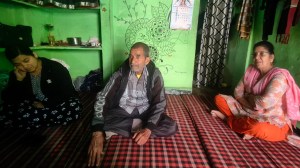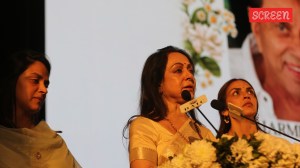The New Delhi
After eight years of wandering in the unfamiliar wilderness called opposition politics, the Congress returned to claim its old status8212;a...

After eight years of wandering in the unfamiliar wilderness called opposition politics, the Congress returned to claim its old status8212;albeit partially8212;today, as President A P J Abdul Kalam administered the oath of office at a solemn ceremony in Rashtrapati Bhavan to the first-ever Congress-led coalition government since Independence.
The usual suspects of the Grand Old Party8217;s old guard were all there but jostling for place in the front ranks were many who had never been part of the Congress movement8212;Laloo Prasad Yadav and Ram Vilas Paswan, Dayanidhi Maran and A Ramadoss8212;or who like Sharad Pawar had walked out of the party in bitterness.
Congress president Sonia Gandhi may have declined the post of prime minister earlier this week but her imprint was all over.
The 68-member council of ministers headed by Manmohan Singh gave preference to the 8220;veterans8221; over 8220;newcomers8221;; took forward Sonia8217;s pre-poll alliance-making skills to give key allies handsome representation; made a point to reward 8220;loyalists8221; and punish dissidents; and emphasised the pro-minorities concerns of the new government by giving seven ministerships to Muslims, compared to just one in the previous NDA dispensation.
When it came to Cabinet posts, the Congress leadership went in for experience, bringing in a host of 8220;heavyweights8221; with previous stints in government. Apart from Arjun Singh, Pranab Mukherjee, Ghulam Nabi Azad, P. Chidamabaram, Jaipal Reddy, and Kamal Nath all of whom have been ministers before, two veterans8212;Shivraj Patil and P M Sayeed8212;were included even though both lost the 2004 polls. The inclusion of P. Chidambaram, overruling opposition within Congress ranks because he had left the party some years ago, is particularly significant, and indicates that Singh is keen to use his acknowledged expertise in pursuing his nuanced reforms agenda.
| nbsp; |
Forgive and forget
|
||||
| nbsp; |
If DMK8217;s Subbulakshmi Jagadeesan, 56, stands out, it8217;s not just because she is the lone woman minister from TN: |
nbsp; | |||
Another significant inclusion was Shankarsinh Vaghela, the ex-RSS swayamsevak turned Congress strongman in Gujarat. He was disliked by party veterans in the state but led an unexpected Congress comeback in Modi8217;s Hindutva laboratory and was suitably rewarded. Loyalists such as Sunil Dutt and Mani Shankar Aiyar who led the 8220;Sonia must not step down8221; brigade at the CPP meeting on Tuesday were also given Cabinet ranks, while Kumari Selja, Prithviraj Chauhan and Oscar Fernandes8212; who worked hard during Campaign 2004 8212; became ministers of state.
On the other hand, speculation that either A K Antony or K Karunanakaran or both would get Cabinet posts was proved wrong. The bitter factional fight in Kerala, responsible for the rout in the state, ensured that there is no Congress representation from Kerala in this government E Ahmad of IUML is the only Keralite sworn in, in stark contrast to neighbouring Tamil Nadu which has as many as 12 ministers including six Cabinet ministers8212;the biggest Tamil presence in Delhi ever.
The most significant aspect of the Singh government was not who were included but those who were left out. Sonia Gandhi8217;s 8220;core team8221; that assisted her in the election campaign8212;Ambika Soni, Ahmad Patel, Salman Khursheed, Jairam Ramesh et al8212;were kept out of government, indicating that she is keen to retain their services to revive the party.
The same motive is reflected in the total absence of Generation Next. While Rahul Gandhi had ruled out being a minister in favour of party work, some of the others8212;Jyotiraditya Scindia and Ajay Maken in particular8212;were widely expected to be made a minister of state. But not a single member of the 8220;sonshine club8221;8212;Sachin Pilot, Milind Deora, Jitin Prasad8212;were made even deputy ministers, indicating that Sonia perhaps wants them to first cut their teeth as MPs before giving them a taste of power.
The same criteria was clearly not applied to the allies. Dayanidhi Maran, son of the late Murasoli Maran and grand nephew of DMK chief K.Karunanidhi, and R. Ambumani, son of PMK chief S. Ramadoss, have not just joined the ministry but have been given the Cabinet rank.
Laloo Prasad Yadav8217;s temper tantrums also worked. The RJD, the second largest party in the alliance with 21 MPs, has managed eight ministerial berths, including two Cabinet posts for Laloo himself and Raghuvansh Prasad Singh. While the RJD has got what it wants, its Bihar partner Ram Vilas Paswan went into a sulk today on learning that he was being bypassed for the coveted Railways portfolio.
- 01
- 02
- 03
- 04
- 05






























